- Home
- Piers Anthony
Executive Page 26
Executive Read online
Page 26
As the days passed I came to know Gray. He had a wife from whom he was estranged, and a six-year-old daughter he visited at every opportunity. He shared custody, but now that she was entering school, she couldn’t be with him in the bubble. He was evidently irritated about that; he had no objection to education, but he loved his child and didn’t like the separation. Thus the school became the focus of his ire.
“You see the kind of books they’re using to teach those kids to read?” he demanded rhetorically. “Dick and Jane?”
I admitted that I hadn’t. “My ward is fifteen,” I said. “She’s beyond Dick and Jane, though she’s still perfecting her reading. She’s—” I shrugged. “They call it retarded. She doesn’t take well to schools, so I had to have her tutored. Now she’s carrying on alone; if she passes the test, she’ll get her credit, anyway.”
“Ward?” he asked. It seemed he hadn’t been informed about this, either.
I shrugged again. “She—we wanted each other, and it’s legal now, but some folk don’t understand. I lost my other job because of that, but we’re together.”
He nodded. “Man’s business with a woman is his own, if she’s consenting.” I knew from the records I had checked that he was tolerant on this score, for his interest in a woman not much older had been responsible for the damage to his marriage.
“You mentioned the early reading books,” I said. “I was educated on Callisto, and I learned English as a second language. We didn’t use Dick and Jane, but I know they’ve been around for centuries. I guess they’re pretty stodgy.”
He laughed. “You haven’t seen ‘em? Then you sure don’t know! They aren’t stodgy anymore! I was helping Lisa to read from them, and I nearly got a hard-on! What the hell are they teaching our kids these days?”
I remembered that Hopie had set out to reform the school system in many ways, but this sounded strange. “Just what is in those books?”
“I’ll tell you what’s in ‘em!” he exclaimed, getting his ire in gear again. Those who are tolerant about man’s business can be less so about children’s business. “Here she was reading this book, ‘See Dick run. Run run run.’ Then next page it says, ‘Dick runs to Jane’s house.’ Jane says, ‘I’ll show you mine if you’ll show me yours.’ Dick says, ‘Great!’ Then Jane lifts up her dress. Dick looks. ‘Look, look, look!’ I mean, it goes on like that! Playing sneak-peek behind the couch. And that’s only the beginning!”
I managed to avoid a smile. Hopie had certainly reformed the first-grade reader! My daughter, who had been so shocked at my relationship with Amber. Surely Thorley had not been responsible for this suggestion; she must have gotten it from Roulette. “How did Lisa react to it?”
“She thought it was great!” he said indignantly. “She couldn’t wait to turn the page. She couldn’t even handle all the words on the one page, but she wanted to get to the part where Dick showed his. ‘See it grow. Big, big, big!’ My six-year-old little girl!”
“Well, curiosity is natural in children. If such material encourages them to read—”
“It did that, all right!” he agreed. “But, my God—if that’s what’s in the first-grade reader, what the hell’s in the second-grade reader? What’s in the high school reader?”
“I don’t think they’ve changed those yet,” I said. “Amena’s in that one, and it’s copyrighted 2650. They’re probably stair-stepping it up, following one grade through, until the whole school system’s been updated.”
“Then it’s not too late to get rid of this smut!” he said.
“Lots of luck,” I said. “The Tyrancy’s pretty set in its ways.”
“The Tyrancy!” he exclaimed. “I thought it was great at first, but now with this shit, and the med cutoff—” He grimaced.
“You’re over the limit?” I asked. This was an excellent way to survey the reactions of the common man to the new programs.
“My mother is. She’s seventy-five, and the cutoff ’s at seventy. First time she gets sick, they’ll just let her die. How can they do that? She’s a good woman!”
“Well, I heard that medical expenses were getting up so high—”
“Sure, and they need to be cut back. But not out of my mother’s hide!”
There, of course, was the rub. People who agreed with the thrust of the new programs still didn’t want to pay the price themselves. But ultimately every program had to be paid by the people; there was no other way.
“I wonder,” I said. “Your Lisa—my Amena can’t speak English, but she understands it. She might listen, and she could signal ‘no’ if the word was wrong. That way you could use books outside the Dick and Jane trainer.”
His face brightened. “Sure thing! Let’s try it.”
We tried it the next time his daughter came to visit. Amber had learned how to read English now, which made it possible for her to study in that language, since it was not necessary to speak what she was reading. We found a fairly simple book, and little Lisa read aloud, and Amber nodded affirmatively for the right words and negatively for the wrong ones. The two girls liked the arrangement, and it seemed to help both.
The work progressed, and by the time I drilled my last bolt hole, the first tier of apartments was anchored on the region where I had started, and the second tier was in progress. So, things were moving along, but I saw that it would have been far more efficient had all the holes been drilled together by a skilled crew that traveled from bubble to bubble, so that in one day the next step could proceed. As it was, my speed of work limited the following work, making it inefficient. I mentioned this to Gray, and he agreed. “But don’t bother suggesting it to the front office,” he advised. “This is JBC, guaranteed inefficient. If we started doing things the way they should be done, we’d get halfway competitive with the private bubble companies, and the bureaucrats would be out of work.”
“But I thought this company was planetized in order to make it competitive!” I protested.
“Fat laugh! No government ever made anything competitive. There’s no incentive.”
“Something I’ve got to tell you—” I began.
“That you’re in training to take over? I found out.”
“It wasn’t supposed to be a secret,” I protested.
“The damn inefficient paperwork took so long to come down, I might never have been informed,” he said. “But you’re such a bright one, I couldn’t figure what you were doing here in the bottom echelon. So I inquired.”
“You aren’t angry that I didn’t tell you?”
“I know why you didn’t tell me! You figured you wouldn’t learn much if you walked up and said, ‘Hey, boss, I’m going to be your boss soon, so watch your step!”
“I really hadn’t thought of it that way.”
“I guess you didn’t. You’re a decent guy; you really want to learn. So you just kept your mouth shut and learned, and I let you. Comes to the same thing. My recommendation’s already in; you got a good one, same as it would have been if you’d been for real. You did good work.”
“I tried to,” I said. “But, look—when I do get there, I really do want to turn this company around. Certainly I’ll change the hole-drilling routine. But that’s only one facet of a huge operation; I can’t learn it all from direct personal experience. So if you have any notions, I want to hear them.”
“Thought you’d never ask. I have this bright idea for a new kind of bubble, but nobody’d listen. I think it could put one like this on the market at half the price.”
“A fifty percent saving on a city-bubble? If there’s no catch—”
“See, there’re a thousand little bubbles down there growing, for every big one. And a lot of fragments. They don’t all grow perfect. Those pieces bobble around a while and drop out; when they’re not hollow, they get to weigh too much. But there’s a lot of good stuff there. Bubblene is valuable no matter what shape it’s in. I figure we could fish out all the little bubbles, twenty feet in diameter, that we throw back now, and some chun
ks of solid bubblene, and take, ‘em into a big workshop bubble and melt ‘em together so we have maybe a hundred little ones making one big one, like a bagful of balloons, tied in together by the spare bubblene. Put a lock in each one, make it an apartment. The whole thing spins for gee. Can leave the center hollow, even, or use it for storage. Could have a hundred home-bubbles in one big ring, even, spinning for gee. Because they’re so much more common than the big, perfect ones, and no complex internal structures are needed, the cost would be much less.” He paused to see how I was taking it.
“Makes so much sense, I don’t see why they aren’t doing it already,” I remarked. “Are you sure there’s no catch?”
“If there is, I don’t know it. Some apartments are set up isolated, anyway; the people seem to like them. This is just bigger-scale.”
I remembered the apartment complex where I had found Megan twenty years before. Spheres on the ends of rods, the whole complex rotating for gee. Larger bubble arrangements like that, or in other shapes, each apartment separate—I saw nothing against it. “There has to be some reason they wouldn’t go for it,” I said. “It makes too much sense to ignore.”
“Well, when you get there, you look up the files and find out which one my suggestion’s filed in. Maybe they put the reason there.”
“I will.”
“You’ll be moving on now,” he said.
“To the apartment installation crew,” I agreed. “I have to learn something about every facet of this operation.”
“They don’t seem to be rushing it much,” he said. “You didn’t need to spend a whole month on holes just to learn how it’s done.”
“I’m not their choice for top exec,” I confided.
He burst out laughing. “So that’s it! They figure if they drag you around in it long enough, you’ll got tired and quit.”
“Or foul up, so they can fire me before I get power,” I agreed.
“Why don’t they just torpedo you, then? There’re lots of ways you can make a person foul up, if you’ve a mind.”
“I have to wash out legitimately. I think the Tyrancy’s getting fed up with bungling, and if they were caught messing up the new boss—-”
“Maybe,” he agreed. “Or maybe they’re bungling that job, like everything else.” He pondered a moment, then said, “You know, the boys’ve been staying clear of you, because of what you are. But you seem okay to me. Why don’t you come into town with us tonight? You can hear a lot of ideas, if you’re really interested.”
I had been aware that there was not much socializing, but since many of the times that I went into town alone or with Amber were actually secret returns to my role as Tyrant, I had found it convenient. Still, I did want to know the pulse of the common man, and this seemed like a good opportunity.
Five of us went stag to a bar and had alcoholic drinks. I was afraid they would also go to a civilian tail, but they knew of my situation with Amber and spared me that. Instead they went to an execution.
I am not sure I have discussed this before. It had been my original intention as Tyrant to eliminate the death penalty for crime, but circumstances had overtaken me. We were undertaking a program to control population, and also to save money. It turned out to be nonsensical to allow old sick folk to die without medication and to prevent new babies from being born, while preserving the lives of murderers. There had turned out to be plenty of lesser criminals to man the inclement space stations: those who had some potential to reform and return eventually to society. So the death penalty had remained despite my initial misgiving. But with a twist. Roulette had worked this out, and I had lacked the gumption to overrule her.
A large audience had formed for the occasion. Men, women, and even some children. On the stage in front were the prisoner, the judge, and a woman in black: the representative of the victim. The prisoner was bound beside a wall.
“The accused has been found guilty of murdering John Jones, as charged,” the judge said, and his amplified words carried throughout the chamber. “I hereby sentence him to be lasered until dead.” He turned to the woman. “You, Mrs. Jones, widow of the deceased, may execute him yourself.” He handed her a laser rifle.
The woman shied away from it. “Oh, I could not do that!” she protested. There was a murmur of mixed emotion from the audience.
“Then it is your privilege to give the order to the execution squad,” the judge said. At his signal a troop of six men entered, each carrying a laser rifle. They lined up and took aim at the prisoner.
The woman tried, but the sound would not come out of her mouth despite the yelled encouragement of members of the audience. Some were eating candy, I noted. I was disgusted, not so much at them as at myself. How could I have let such a scene be legitimized under my government?
“If you do not choose to take vengeance yourself,” the judge said sternly, “then I shall select at random another person to do it.”
When the woman backed away, demurring, the judge looked out over the audience. His glance passed across the various interested spectators and halted at the one who had the greatest doubt about the proceeding. “You,” he said.
I started. He was speaking to me!
“I can’t,” I protested.
“On pain of being found in contempt of this court,” he said firmly, “I direct you to perform this office for the representative of the deceased. Only in this manner will justice be fulfilled.”
Still I hesitated. I had never expected to be tapped for this! Yet it was my doing, however indirect. Was I to lack the stomach to carry out my own policy?
“Do it! Do it! Do it!” the audience chanted.
“Order!” the judge rapped, and the chant faded.
Now his gaze returned to me. “Come up here. Address the execution squad.”
Numbly I mounted the stage. I faced the firing squad. I took a breath. “Fire,” I said.
Six lasers fired. They were heavy-duty; in an instant the body of the prisoner was charred black. It fell to the floor.
A cheer went up. Justice had been served! But somehow I did not find it satisfying.
The judge handed the woman in black a slip of paper. “Here is your certificate for one birth,” he said. “In this manner may the life lost be returned to you.”
That was it. The woman now had permission to have a baby; the paper would gain her a spot antidote to the universal contraceptive in the environment. But how would she conceive it with her husband gone?
The answer became apparent. Already men surrounded the widow, proposing marriage. The demand for the right to procreate was enormous. She might come out of this in better condition than before the murder. If that was what counted.
Suddenly I appreciated on a gut level the common man’s objection to the Tyrancy. I was beginning to feel it myself.
CHAPTER 11
REVOLUTIONARY
I proceeded through the other stages of my apprenticeship, learning how to install apartment cubes, lay out major halls, organize waste processors, put in power and communications lines, and handle the mountainous paperwork required for every stage. By the time I was ready to assume the helm, more than a year had passed, and I was none too certain I was ready. But I knew it had to be done.
The fundamental problem with Jupiter Bubble Company was that it was huge, impersonal, and inefficient. There was little dedication to speed, price, or quality, and those who attempted to improve these things were either fired or shuffled elsewhere. Paperwork had become an end in itself, and experimentation was discouraged. There were no values, no company spirit. The structure was rotting from the core and didn’t seem to care.
On my way up I had taken note of the minority of genuinely dedicated workers and supervisors. My first act as company president was to summon these people for a conference. Gray was among them, but only one among many.
“You, all of you, are about to assume the management of this company,” I informed them. “Each of you will be put in charge of a particular aspect
or program relevant to your expertise. You will select your own personnel from those remaining in the company and designate their duties. They will answer directly to you, and you will answer directly to me. This will be done personally; if you find it necessary to write a memo, it shall be confined to one page, preferably less. There will be no paperwork, apart from minimum specifications for complex aspects. I trust your judgment, and I will hold you responsible. If you tell me a program is good, I will support it; see that you do not let me down.”
They turned to each other, not quite knowing what to make of this, but I was serious. I put Gray in charge of the Micro Bubble task force: to develop a viable program for producing the type of small-bubble complex he had described to me, and then to implement it. I put the others in charge of programs relevant to their interests and competencies. I gave them autonomy and authority. I stressed that our company interest, as of that instant, was first for quality and reliability, then for value, then for service to our customers, then for efficiency, and finally for profit. “We shall be losing money for a time,” I admitted. “But we’ve been losing money for three years; that’s nothing new. Once we change, that will change.”

 Serial
Serial Question Quest
Question Quest Chthon
Chthon Dragon on a Pedestal
Dragon on a Pedestal E. S. P. Worm
E. S. P. Worm Hope of Earth
Hope of Earth The Series Boxed Set
The Series Boxed Set Blue Adept
Blue Adept The Sopaths
The Sopaths Beetle Juice
Beetle Juice Awares
Awares Golem in the Gears
Golem in the Gears Geis of the Gargoyle
Geis of the Gargoyle Bamboo Bloodbath and Ninja's Revenge
Bamboo Bloodbath and Ninja's Revenge Heaven Cent
Heaven Cent Neq the Sword
Neq the Sword Pandora Park
Pandora Park Juxtaposition
Juxtaposition Bearing an Hourglass
Bearing an Hourglass Dragon Assassin
Dragon Assassin Board Stiff
Board Stiff Virtual Mode
Virtual Mode Castle Roogna
Castle Roogna Aliena Too
Aliena Too Pet Peeve
Pet Peeve The Metal Maiden Collection
The Metal Maiden Collection Volk
Volk Phaze Doubt
Phaze Doubt The Color of Her Panties
The Color of Her Panties Amazon Slaughter and Curse of the Ninja Piers Anthony
Amazon Slaughter and Curse of the Ninja Piers Anthony The Worm Returns
The Worm Returns Zombie Lover
Zombie Lover Xone of Contention
Xone of Contention The Gutbucket Quest
The Gutbucket Quest Split Infinity
Split Infinity Dream a Little Dream: A Tale of Myth and Moonshine
Dream a Little Dream: A Tale of Myth and Moonshine Balook
Balook Out of Phaze
Out of Phaze The Secret of Spring
The Secret of Spring Mouvar's Magic
Mouvar's Magic Cube Route
Cube Route Mercenary
Mercenary Total Recall
Total Recall Man From Mundania
Man From Mundania The Magic Fart
The Magic Fart Letters to Jenny
Letters to Jenny Jack and the Giants
Jack and the Giants Executive
Executive Robot Adept
Robot Adept On A Pale Horse
On A Pale Horse Vale of the Vole
Vale of the Vole Crewel Lye
Crewel Lye For Love of Evil
For Love of Evil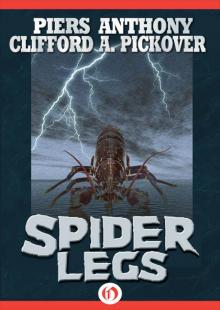 Spider Legs
Spider Legs Mute
Mute Being a Green Mother
Being a Green Mother Hair Suite
Hair Suite Air Apparent
Air Apparent Politician
Politician Aliena
Aliena Phthor
Phthor Ghost Writer in the Sky
Ghost Writer in the Sky Pornucopia
Pornucopia Eroma
Eroma Shepherd
Shepherd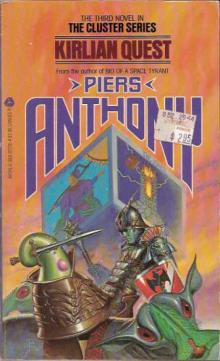 Kirlian Quest
Kirlian Quest Swell Foop
Swell Foop God of Tarot
God of Tarot If I Pay Thee Not in Gold
If I Pay Thee Not in Gold Amazon Expedient
Amazon Expedient Faun & Games
Faun & Games Vision of Tarot
Vision of Tarot Centaur Aisle
Centaur Aisle Serpent's Silver
Serpent's Silver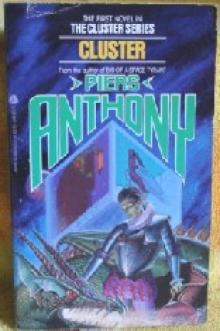 Cluster
Cluster With a Tangled Skein
With a Tangled Skein Chaining the Lady
Chaining the Lady Wielding a Red Sword
Wielding a Red Sword Key to Chroma
Key to Chroma WereWoman
WereWoman Isis Orb
Isis Orb Hair Peace
Hair Peace Two to the Fifth
Two to the Fifth Viscous Circle
Viscous Circle Skeleton Key
Skeleton Key Cautionary Tales
Cautionary Tales The Source of Magic
The Source of Magic Unicorn Point
Unicorn Point Writer's Retweet
Writer's Retweet Demons Don't Dream
Demons Don't Dream Ogre, Ogre
Ogre, Ogre The Iron Maiden
The Iron Maiden Tortoise Reform
Tortoise Reform Luck of the Draw
Luck of the Draw A Spell for Chameleon
A Spell for Chameleon Yon Ill Wind
Yon Ill Wind Currant Events
Currant Events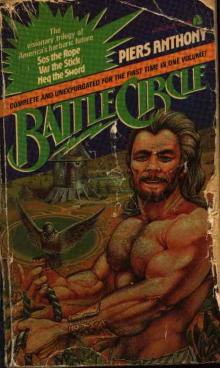 Var the Stick
Var the Stick And Eternity
And Eternity Kiai! & Mistress of Death
Kiai! & Mistress of Death Chimaera's Copper
Chimaera's Copper Refugee
Refugee Isle of View
Isle of View Thousandstar
Thousandstar Mer-Cycle
Mer-Cycle Service Goat
Service Goat Five Portraits
Five Portraits Night Mare
Night Mare Steppe
Steppe Lavabull
Lavabull Well-Tempered Clavicle
Well-Tempered Clavicle Aladdin Relighted
Aladdin Relighted Aladdin and the Flying Dutchman
Aladdin and the Flying Dutchman Knot Gneiss
Knot Gneiss Roc and a Hard Place
Roc and a Hard Place Aladdin Sins Bad
Aladdin Sins Bad Flytrap
Flytrap Prostho Plus
Prostho Plus Esrever Doom
Esrever Doom Hair Power
Hair Power The Journey
The Journey Virtue Inverted
Virtue Inverted Of Man and Manta Omnibus
Of Man and Manta Omnibus Trail Mix: Amoeba
Trail Mix: Amoeba Noah's Brick
Noah's Brick Odd Exam
Odd Exam Magenta Salvation
Magenta Salvation Jest Right
Jest Right Fire Sail
Fire Sail Chthon a-1
Chthon a-1 Amoeba
Amoeba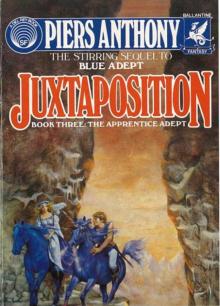 Juxtaposition aa-3
Juxtaposition aa-3 Pira
Pira THE CATERPILLARS QUESTION
THE CATERPILLARS QUESTION What Fears Become: An Anthology from The Horror Zine
What Fears Become: An Anthology from The Horror Zine Bio of a Space Tyrant Vol. 3. Politician
Bio of a Space Tyrant Vol. 3. Politician Ogre Ogre x-5
Ogre Ogre x-5 Rings of Ice
Rings of Ice On a Pale Horse ioi-1
On a Pale Horse ioi-1 Luck of the Draw (Xanth)
Luck of the Draw (Xanth) Centaur Aisle x-4
Centaur Aisle x-4 Thousandstar (#4 of the Cluster series)
Thousandstar (#4 of the Cluster series) Gutbucket Quest
Gutbucket Quest Isle of Woman (Geodyssey)
Isle of Woman (Geodyssey) Chaining the Lady c-2
Chaining the Lady c-2 To Be a Woman
To Be a Woman Cluster c-1
Cluster c-1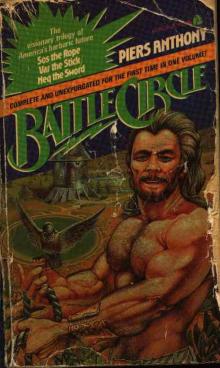 Battle Circle 2 - Var the Stick
Battle Circle 2 - Var the Stick Mercenary (Bio of a Space Tyrant Book 2)
Mercenary (Bio of a Space Tyrant Book 2)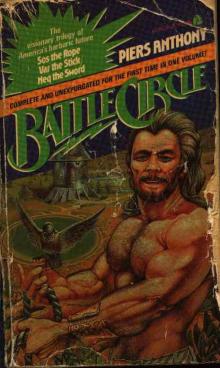 Battle Circle 1 - Sos the Rope
Battle Circle 1 - Sos the Rope Xanth 30 - Stork Naked
Xanth 30 - Stork Naked Secret of Spring
Secret of Spring Xanth 29 - Pet Peeve
Xanth 29 - Pet Peeve Serpents's Silver
Serpents's Silver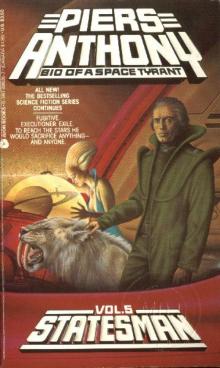 Statesman by Piers Anthony
Statesman by Piers Anthony Out of Phaze aa-4
Out of Phaze aa-4 Amazon Slaughter & Curse of the Ninja
Amazon Slaughter & Curse of the Ninja